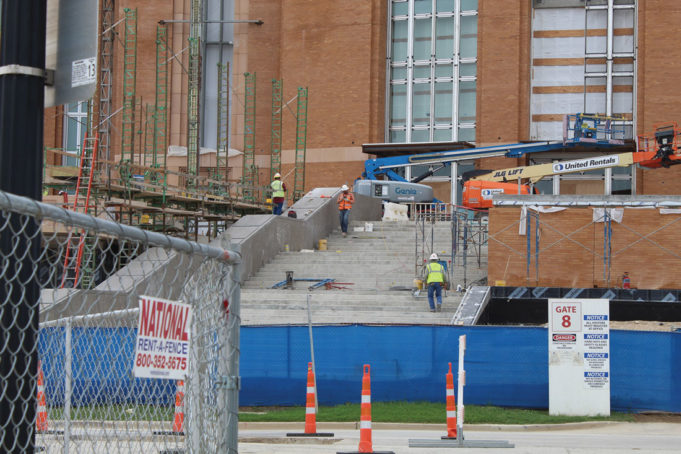Construction in Fort Worth is booming. Fueled by a swelling population, developers within the 15th-largest city in the United States are playing catch-up. Posh developments like Waterside, The Shops at Clearfork, and Crockett Row at West 7th boast dozens of new retail stores and restaurants. Walsh Ranch aims to add 50,000 residents to Fort Worth’s residential portfolio in the coming years.
But before each business or home can be opened or sold to a tenant, a city-approved inspection is required to verify that the project meets safety guidelines set by Fort Worth’s Planning and Development Department. In recent years, Fort Worth has increasingly relied upon third-party contractors for that heavy lifting. The change effectively means local developers are freer to shop around for inspection companies. Private companies are quick to paint city inspectors as slow and inefficient, despite city data shared with the Weekly that shows 94.6 percent of city inspectors performed their jobs “on time” over the past 12 months.
On its website, one local inspection agency boasts that it “has a contract with the City of Fort Worth that allows us to perform the same work done by the city in half the time and with far greater customer service.”
One city inspector has grave concerns about the trend. He spoke with us on condition of anonymity. We gave him the pseudonym Joel for this story.
“Fort Worth has allowed this major erosion to take place,” Joel said. “There is a deception going on. If the third-party inspector is too demanding on the builder, the builder will threaten to pull the contract [and work with another third-party inspector]. It happens.”
And therein lies the biggest danger, Joel said. It’s not that these private inspection businesses aren’t qualified to perform the important work they do. The companies are required to have the same training and accreditation as city employees, and city policy requires final sign-offs on finished homes and businesses by a city staffer. But a private development company in Fort Worth has the leverage to shop around for the most accommodating third-party business on the market, he said. Many Fort Worthians, Joel added, don’t know that their homes are being inspected by private companies. Most Fort Worthians also probably don’t know that most major projects, including the $500 million Dickies Arena, an immense point of pride for Fort Worth civic leaders, are inspected by third-party companies.
I reached out to Bureau Veritas, an international third-party inspection company with an office in Fort Worth. Before I was able to ask for a response to Joel’s concerns, I was cut off.
“We don’t comment on anything,” a Bureau Veritas manager told me. “Don’t call any of our people.”
Other calls to local agencies were not returned. Allison Gray, assistant planning and development manager, told me in an email that the city began its current third-party program in 1999 as a response to “demands by the development community for timely review of construction projects and the city’s inability to meet that demand due to heavy workload and difficulty in hiring qualified staff.”
Fort Worth currently contracts with six private companies for inspections: Bureau Veritas, Code Pro, Code Solutions, MetroCode, North Texas Inspection Services, and Winston Services. The city currently employs 34 inspectors, including three supervisors and three parkway inspectors, Gray said. Between 2015 and 2018, she added, the city maintained its current number of inspectors. City communications director Kevin Neal said the 2019 budget does not include any new inspector positions.
Joel said he knows former city inspectors who left to work for a third-party business to earn higher pay. Hourly wages for city inspectors stand at $20.87, according to Gray, while an inspector working for a private company can expect $29.74 per hour, according to the online salary resource Payscale. I reached out to city officials in Austin, Dallas, and Houston to gauge the prevalence of third-party inspectors on city projects. The only city to reply in time, Austin, uses third-party inspectors in a similar fashion to Fort Worth.
According to city fee guidelines, safety permit fees can run into the thousands or tens of thousands of dollars, meaning the city is losing part of a large revenue source by allowing outside contractors into the safety business. Joel said that by allowing third-party inspectors to advertise directly to construction projects, the city is violating its own conflict of interest policy, which states that private businesses “shall not be associated in any way with the Third Party Organization.”
Gray said using third-party inspectors is not in violation of the city’s conflict of interest policy because the interactions between outside contractors and developers do not constitute a “substantial interest.” She went on to cite the lengthy legal definition of substantial interest, which, among several other clauses, restricts “Third Party Companies [from having] any voting shares” in the private businesses they contract for.
Toward the end of my interview with Joel, he described how he enjoys working for the city and exploring Fort Worth through onsite inspections. But if he receives a call from an outside agency to do the same work for higher pay, he knows what he’d say.
“If the offer was there, I would say more than half” of his colleagues would go, he said. “Myself included.”













You deftly attribute the building boom to the swelling population alone, as if the Trump economy has nothing to do with it.